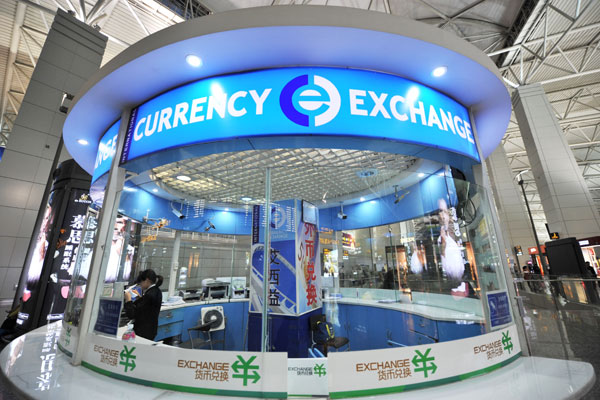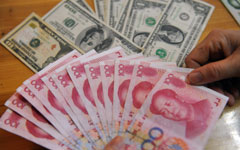 |
|
A currency exchange counter at Guangzhou Baiyun International Airport. Provided to China Daily |
Zhou says central bank policies will gradually make way for market forces
Zhou Xiaochuan, head of the People's Bank of China, shed new light on the central bank's policies on interest rate liberalization and the yuan's exchange rate in the latest Bo'ao Forum for Asia.
On Friday, Zhou pledged the PBOC will gradually exit from its present regular interference with the exchange rates to make way for market forces to determine the yuan's price.
The change is another reform that will see two-way fluctuations in the currency's exchange rate, although they will not necessarily reflect the central bank's monetary policy.
 |
Zhou promised that further steps will be taken toward the marketization of the yuan exchange rate after the PBOC widened in March its daily fluctuation against the US dollar from 1 to 2 percent.
The pledge was made shortly after a recent depreciation of the yuan against the US dollar was seen as a threat. The United States warned Beijing on Monday that the depreciation would cause "serious concerns" if it signaled a policy shift away from having a market-determined exchange rate, Reuters reported on April 7.
The yuan's exchange mechanism has evolved consistently with China's reform and will allow the market to play an even bigger role in the future, Zhou said.
On Thursday, the central bank governor said China will quicken the process of yuan interest rate liberalization and expand the band of fluctuation for the interest rate on renminbi deposits, giving greater power for financial service institutions to set their own prices for holding the currency.
Zhou said China will also quicken the yuan's convertibility on the capital account to facilitate the business of private investors and capital market transactions. The statement was made after the announcement that, after six months of preparation, investors in the Shanghai and Hong Kong stock exchanges will enjoy access to each others' markets.
